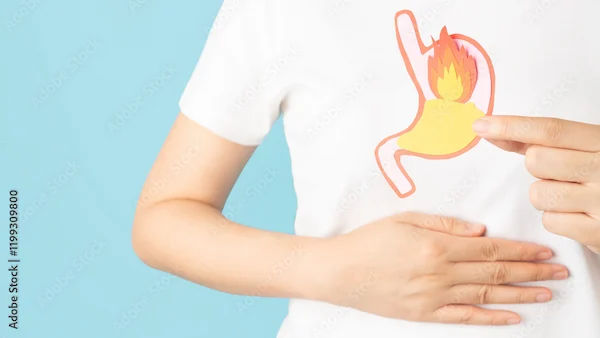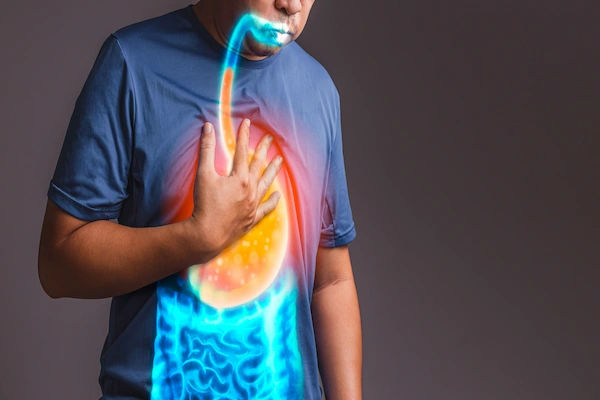What Leads To Signs Of Gastritis And
Discover the causes, symptoms, and relief options for gastritis. Learn how lifestyle, infections, and medications can trigger stomach inflammation.

Written by Dr. Dhankecha Mayank Dineshbhai
Reviewed by Dr. Rohinipriyanka Pondugula MBBS
Last updated on 13th Jan, 2026

Introduction
That nagging, burning sensation in your upper abdomen, the feeling of fullness after just a few bites, or sudden nausea—these are all potential signs of gastritis. But what exactly is happening inside your body to cause this discomfort? Gastritis isn't a single disease but a condition characterised by the inflammation, irritation, or erosion of the stomach lining. It can strike suddenly (acute) or develop slowly over time (chronic). Understanding what leads to these signs of gastritis is the first crucial step towards finding effective relief and protecting your long-term digestive health. This article will demystify the common and less common causes, from bacterial infections to everyday habits, and guide you through the symptoms, diagnosis, and pathways to healing.
Your stomach lining is a robust layer of cells that produces acid and enzymes to break down food, protected by a thick layer of mucus that shields it from its own corrosive secretions. Gastritis occurs when this protective barrier becomes weakened or damaged, allowing digestive juices to inflame and irritate the underlying stomach lining. This inflammation can lead to a variety of uncomfortable symptoms and, if left untreated, may result in complications like ulcers or an increased risk of stomach cancer.
Acute vs. Chronic Gastritis: What's the Difference?
- Acute Gastritis: This form appears suddenly and is often severe. It's typically caused by a specific irritant, such as excessive alcohol, strong pain medications, or a bacterial infection. Symptoms are intense but usually short-lived with proper treatment.
- Chronic Gastritis: This type develops gradually and causes long-lasting inflammation. It can persist for years if
unnoticed, as symptoms are often milder. The most common cause is a long-term H. pylori infection. Chronic gastritis
can lead to the wearing away of the stomach lining (atrophic gastritis) and is more associated with serious
complications.
The Most Common Signs and Symptoms of Gastritis
The signs of gastritis can vary widely from person to person. Some individuals may experience no symptoms at all,
while others are met with significant discomfort. The most common indicators include:
- A gnawing or burning ache or pain (indigestion) in your upper abdomen that may become either worse or better after
eating - A persistent feeling of nausea or occasional vomiting
- A sensation of fullness in your upper abdomen after eating, even after a small meal
- Bloating and abdominal gas
- Belching and hiccups
Less Common But Serious Symptoms to Watch For
While the above symptoms are typical, some signs warrant immediate medical attention as they may indicate bleeding
in the stomach lining:
- Vomiting blood, which may appear red or black and resemble coffee grounds
- Dark, tarry stools (a sign of digested blood)
- Severe, sharp abdominal pain
If you experience any of these severe symptoms, it is critical to consult a doctor online with Apollo24|7 for further
evaluation or seek emergency care immediately.
The Primary Culprits: What Directly Causes Gastritis?
The triggers for gastritis often involve factors that disrupt the stomach's natural protective barrier. Here are the most frequent direct causes.
Helicobacter Pylori (H. pylori): The Bacterial Villain
This spiral-shaped bacterium is the leading cause of chronic gastritis worldwide. It's believed to be transmitted through
contaminated food, water, or close personal contact. H. pylori burrows into the stomach lining, weakening the
protective mucus and causing inflammation. Interestingly, many people carry H. pylori without any issues, but for
others, it can trigger significant problems, including ulcers.
NSAIDs and Pain Relievers: A Common Trigger
Regular use of nonsteroidal anti-inflammatory drugs (NSAIDs) like ibuprofen (Advil, Motrin), naproxen (Aleve), and
aspirin is a major cause of both acute and chronic gastritis. These medications reduce substances that help maintain the
protective stomach lining, making it more susceptible to damage from acid.
Excessive Alcohol Consumption
Alcohol is a direct irritant to the stomach lining. Heavy drinking can cause acute gastritis by eroding the mucous layer,
leading to inflammation and bleeding. The risk increases with the amount and frequency of alcohol consumption.
Other Key Factors That Can Lead to Gastritis
Beyond the primary culprits, several other conditions and factors can contribute to the development of gastritis.
Autoimmune Diseases and Gastritis
In rare cases, the body's own immune system mistakenly attacks the healthy cells of the stomach lining. This is known as autoimmune metaplastic atrophic gastritis. It can interfere with the absorption of vitamin B12, potentially leading to
pernicious anaemia.
Bile Reflux and Other Digestive Conditions
Bile—a fluid that helps digest fats—is produced in the liver and stored in the gallbladder. If it flows backward into the
stomach instead of moving through the small intestine (bile reflux), it can cause chronic inflammation and gastritis. This
is often linked to surgery like gastric bypass or peptic ulcers.
Consult a Gastroenterologist for the best advice
Major Stress and Trauma
The body's response to extreme physical stress from major surgery, severe burns, critical illness, or traumatic injuries
can lead to what is called stress-induced gastritis. This acute form can rapidly develop into erosive gastritis and
bleeding. Even significant emotional stress can exacerbate symptoms, though its role as a primary cause is less direct.
How is Gastritis Diagnosed?
If you suspect you have gastritis, a doctor will typically start with a review of your medical history, symptoms, and
lifestyle habits (e.g., NSAID use, alcohol consumption). To confirm a diagnosis, they may recommend one or more
tests:
- H. pylori Test: This can be a blood, stool, or breath test to detect the presence of the bacteria.
- Endoscopy: A thin, flexible tube with a camera (endoscope) is passed down your throat to examine your stomach
lining. The doctor can check for inflammation and take small tissue samples (biopsy) for analysis. - Upper GI Series: An X-ray of your digestive tract after you drink a barium solution, which helps outline any
abnormalities.
Apollo24|7 offers convenient home collection for tests like the H. pylori stool antigen test, making the initial diagnostic
step easier.
When to See a Doctor
It's time to seek professional advice if your symptoms of gastritis persist for more than a week or if you experience any
of the severe symptoms like vomiting blood or black stools. Persistent stomach pain should never be ignored.
Finding Relief: Treatment and Management Strategies
Treatment for gastritis focuses on addressing the underlying cause and promoting healing of the stomach lining.
Medical Treatments and Medications
- Antacids: Provide quick, temporary relief by neutralising stomach acid.
- Proton Pump Inhibitors (PPIs): Drugs like omeprazole and pantoprazole reduce acid production, allowing the lining to heal.
- H2 Blockers: Such as famotidine, which also reduce acid production.
- Antibiotics: A course of two different antibiotics is prescribed to eradicate an H. pylori infection.
- Cytoprotective Agents: Medications that protect the stomach lining.
Dietary and Lifestyle Modifications for Healing
While not a direct cure, adjusting your diet for chronic gastritis is crucial for management and preventing flare-ups.
- Avoid Irritants: Cut back on spicy, acidic, fried, and fatty foods.
- Limit or Avoid Alcohol and Caffeine.
- Eat Smaller, More Frequent Meals to avoid overwhelming your stomach.
- Manage Stress through techniques like yoga, meditation, or light exercise.
- Consider Soothing Foods like yoghurt, ginger, and bland carbohydrates (e.g., toast, rice).
Can You Prevent Gastritis?
While not all causes are preventable, you can significantly reduce your risk by:
- Practising good hygiene to avoid infections like H. pylori.
- Using pain relievers judiciously. Opt for alternatives like acetaminophen when possible, and always take NSAIDs with
food. - Drinking alcohol in moderation.
- Managing stress effectively.
Conclusion
Understanding what leads to signs of gastritis empowers you to take control of your digestive health. From the common
bacterial infection H. pylori to the over-the-counter pain relievers in your cabinet, the causes are often linked to modifiable lifestyle factors. While the symptoms can be deeply uncomfortable, the condition is typically manageable and treatable with the right approach. Listening to your body, recognising the warning signs, and making proactive changes to your diet and habits are foundational steps. However, self-diagnosis and treatment can be risky. If your condition does not improve after trying these methods, or if symptoms are severe, book a physical visit to a doctor with Apollo24|7 for an accurate diagnosis and a personalised treatment plan to get you on the path to healing.
Consult a Gastroenterologist for the best advice
Consult a Gastroenterologist for the best advice

Dr. Sunil Kaul
General Surgeon
30 Years • MBBS, MS, FICS, FIMSA, FMAS
Delhi
Apollo Hospitals Indraprastha, Delhi
(25+ Patients)

Dr. Nachiket Dubale
Gastroenterology/gi Medicine Specialist
13 Years • MBBS, DNB General Medicine, DM Gastroenterology
Pune
Apollo Hospitals Pune, Pune

Dr. Amit Pandita
Gastroenterology/gi Medicine Specialist
10 Years • MBBS. MD (INTERNAL MEDICINE) DrNB (GASTROENTEROLOGY AND HEPATOLOGY)
Delhi
Apollo Hospitals Indraprastha, Delhi

Dr Piyush Vishwakarma
Gastroenterology/gi Medicine Specialist
11 Years • MBBS, MD, DrNB,
Delhi
Apollo Hospitals Indraprastha, Delhi

Dr. Sitendu Kumar Patel
Gastroenterology/gi Medicine Specialist
13 Years • MBBS, MD, DNB (Gastro)
Bilaspur
Apollo Hospitals Seepat Road, Bilaspur
(25+ Patients)
Consult a Gastroenterologist for the best advice

Dr. Sunil Kaul
General Surgeon
30 Years • MBBS, MS, FICS, FIMSA, FMAS
Delhi
Apollo Hospitals Indraprastha, Delhi
(25+ Patients)

Dr. Nachiket Dubale
Gastroenterology/gi Medicine Specialist
13 Years • MBBS, DNB General Medicine, DM Gastroenterology
Pune
Apollo Hospitals Pune, Pune

Dr. Amit Pandita
Gastroenterology/gi Medicine Specialist
10 Years • MBBS. MD (INTERNAL MEDICINE) DrNB (GASTROENTEROLOGY AND HEPATOLOGY)
Delhi
Apollo Hospitals Indraprastha, Delhi

Dr Piyush Vishwakarma
Gastroenterology/gi Medicine Specialist
11 Years • MBBS, MD, DrNB,
Delhi
Apollo Hospitals Indraprastha, Delhi

Dr. Sitendu Kumar Patel
Gastroenterology/gi Medicine Specialist
13 Years • MBBS, MD, DNB (Gastro)
Bilaspur
Apollo Hospitals Seepat Road, Bilaspur
(25+ Patients)
More articles from Gastritis
Frequently Asked Questions
What does gastritis pain feel like?
Gastritis pain is typically a gnawing or burning sensation located in the upper central abdomen (the epigastric region). It can be sharp or dull and may temporarily improve or worsen after eating.
Can stress and anxiety really cause gastritis?
- While extreme physical stress is a direct cause of acute gastritis, chronic emotional stress and anxiety are more likely to exacerbate existing symptoms of gastritis or increase stomach acid production, rather than being a sole cause. However, stress management is a key part of controlling flare-ups.
What are the best natural remedies for gastritis?
Dietary changes are the cornerstone of natural management. This includes eating smaller meals, avoiding trigger foods (spicy, acidic, fatty), consuming probiotic-rich foods like yoghurt, drinking chamomile or ginger tea, and managing stress. These should complement, not replace, medical advice.
How long does it take for gastritis to heal?
Acute gastritis may start to improve within a few days of treatment and avoiding triggers. Healing chronic gastritis, especially from H. pylori, can take several weeks or even months of consistent treatment and dietary management. Patience and adherence to your doctor's plan are essential.
What is the difference between gastritis and acid reflux (GERD)?
Gastritis is inflammation of the stomach lining, causing localised pain, nausea, and fullness. GERD (gastroesophageal reflux disease) is caused by stomach acid flowing back up into the oesophagus, leading to heartburn, regurgitation, and chest pain. They can occur together but are distinct conditions.


